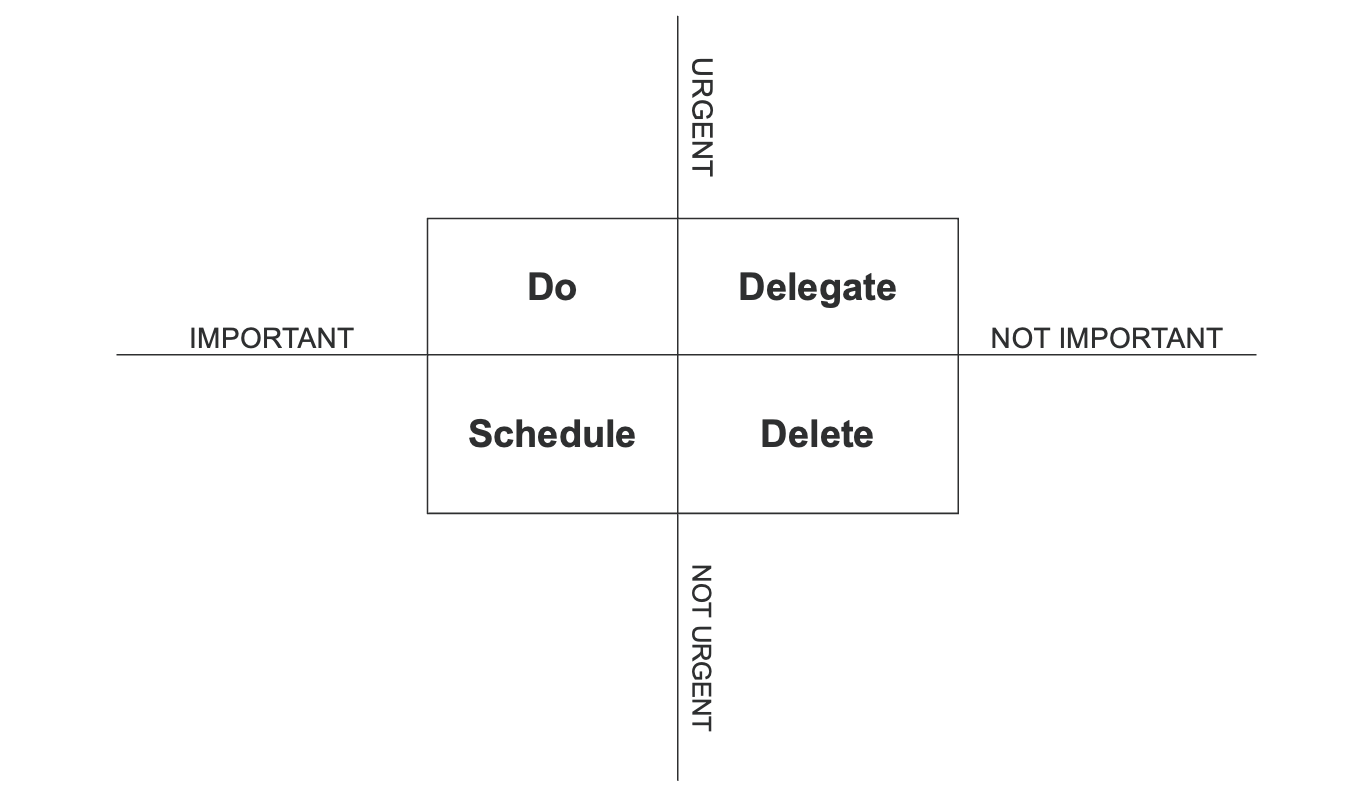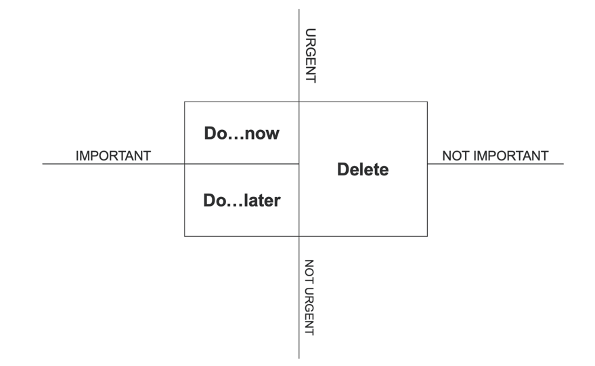- Advice
How To Focus on What’s Important and Actually Get It Done
In 1954 President Eisenhower cited the juxtaposition between importance and urgency in his famous quote, “I have two kinds of problems, the urgent and the important. The urgent are not important, and the important are never urgent.”
Decades later, Stephen Covey, author of The 7 Habits of Highly Effective People, created the Eisenhower Matrix based on this concept to help people categorize their tasks based on indicators of urgency and importance.

This matrix is used widely to help people organize their to-do lists and prioritize their time.
The problem with this model is that we shouldn’t be doing anything unimportant. If it isn’t important, then it shouldn’t be on your list at all. Putting things into a category of “delegate” can be helpful, but you’re not putting those things there because they’re unimportant; you’re putting them there because someone else can do them better, faster, or cheaper. They’re still important; they’re just not yours to do.
Our time as business owners (and humans) is extremely limited; the hard truth is that we can’t do everything even though we’re told we can. The only way to get “everything” done is to make the list of “everything” smaller.
“[T]he only route to psychological freedom is to let go of the limit defying fantasy of getting it all done and instead to focus on the few things that count.”
- Oliver Burkeman
The way this matrix should be used is that anything that falls on the wrong side of the “important” line should be taken off your list.

How do you decide what is important?
When you work for yourself, your work for your clients is, by definition, important. It is also your responsibility to make sure you’re choosing clients and projects that are intrinsically important and coaching those clients to pay you only to do important things. If you find something on your to-do list for a client that is “unimportant,” it is up to you to figure out how to get that off your list, whether that’s restructuring the work or letting go of that client.
For everything else, you need to examine the reasoning behind why things are on your to-do list to begin with. Are they really important to you, or are they important to someone else? Are they crucial to your overall purpose and life? If it is something you “think” you should be doing but never get around to, maybe it’s time to let it go.
Some things really are urgent
Once you’ve eliminated the non-important things from your list (and believe me, you’ll have to keep doing that repeatedly), you’ll need to prioritize what’s left. This is where you’ll want to bring the top part of that matrix back in and think about what’s urgent and non-urgent.
With all urgent tasks, ask yourself the following questions:
- What is the deadline? Pretty simple; if it doesn’t have one, give it one.
- Is it a real deadline? Many tasks on our list have real deadlines, but there are also instances where tasks have artificial deadlines imposed by our clients or ourselves. Ensure you’re examining the reasoning behind deadlines to ensure that urgency is warranted.
- Who does it? This is where the delegation part comes in. Ask yourself who is best positioned to do all urgent tasks. When you work alone, the answer will often be you, but you must examine whether someone else can do it better, faster, or cheaper. This may mean outsourcing some of your tasks to someone else or asking your client if someone on their team is better positioned to do the job.
Once you’ve answered these questions, put the tasks on your calendar or task tracking system according to the deadlines. You may be tempted to do the more exciting work first or the work for your pickiest client, but with urgent tasks, you have to focus only on the deadlines; otherwise, you’ll miss them.
Some things aren’t urgent but are still important
For non-urgent tasks, you’ll have to use some psychological tricks to fit them in amongst the urgent ones.
Make them time-bound
When you have open-ended tasks with unclear milestones or endpoints (e.g., research, business development), you must make them time-bound in some way. Instead of giving yourself a deadline, set a specific amount of time to work on that thing each day/week/month.
Evaluate value vs. effort
Another way to prioritize the non-urgent tasks is by ranking them in terms of value vs. effort. You can start with the high-value, low-effort tasks, which will give you some quick wins and more willpower to tackle the high-value, high-effort ones. Per the part on elimination, delete anything that is low value, no matter the effort; it’s not worth it.
When life is short (which it is), you have to focus on what matters. Productivity tools like the Eisenhower Matrix continue to reinforce the myth that we can do everything, which leads us to effectively do nothing. Ruthlessly prune the unimportant stuff from your business and life, giving you greater clarity around what is important and greater motivation to focus on it deeply.
